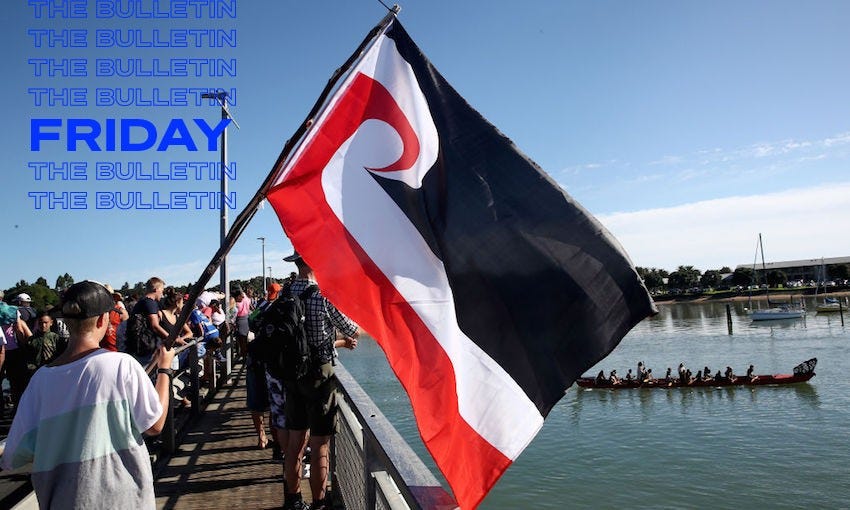The future of co-governance
To mark the death of Moana Jackson we look at the growing debate around co-governance in New Zealand
Mōrena and welcome to The Bulletin for Friday, April 1, by Justin Giovannetti. Presented in partnership with Z Energy.
In today’s edition: Police reinforcements called to parliament; Young Nat admits harassment; ivermectin doesn’t work on Covid; but first, the death of Moana Jackson.
New Zealand’s debate around co-governance is here to stay. (Phil Walter/Getty Images)
A leading voice on Te Tiriti o Waitangi and Māori rights has died.
“E te whatukura, haere e koro, haere atu ra.” Marama Davidson told The Spinoff that she struggled to write her feelings in response to the news Moana Jackson died yesterday. A number of other New Zealanders shared their thoughts on the death of the esteemed lawyer and one of Aotearoa’s most prominent teachers. His work cut across the country, advancing Māori rights through education, law and academia. He helped draft the United Nations Declaration on the Rights of Indigenous Peoples, a document adopted by most of humanity that will continue to shake and redefine colonial states for generations to come. Te Ao Māori News reported on the fingerprints he’s left on modern New Zealand. His sister-in-law and urban Māori advocate Dame Temuranga June Batley-Jackson died on Monday.
‘Deep respect for the mana of all people.’
Among the voices writing about Jackson yesterday was Leonie Hayden. Here’s some of what she shared:
“When I woke up this morning I wondered why the tūī sang so loudly. I know now they were sharing the news that a great tōtara has fallen in Te Wao nui a Tāne. Moana taught me that gentleness and bravery belong together; that you can walk softly in the domain of Tūmatauenga. He taught me that a mind is a weapon, but that it must be kept sharp with compassion and a deep respect for the mana of all people.”
Co-governance between Māori and Crown is now solidly on the country’s political agenda.
Jo Moir writes for Newsroom that the debate over co-governance won’t go away before the next election. Act is now calling for a public referendum on the broad concept of shared decision-making, while the government is pushing forward with a number of shared programmes. They include a new Māori Health Authority, a shared model for three waters governance and more consultations on implementing the Undrip document that Jackson helped write. Cabinet is expected to weigh feedback later this month on how to implement a work programme for co-governance. Breaking with his predecessor’s Demand the Debate campaign, National leader Christopher Luxon told RNZ the time isn’t right for a referendum on co-governance.
Are we ‘brave and imaginative enough’ to solve this?
This can be a difficult debate and all the colonial states built on indigenous land will need to have it, sooner or later. New Zealand First has already stated a firm position that the talk is separatist. David Seymour spoke to The Hui about why he wants a referendum, warning that co-governance will end liberal democracy in Aotearoa. John Tamihere argues that the current system has failed Māori and is itself separatist. Writing in the NZ Herald (paywalled), Tamihere says that Māori want to be empowered to break from dependency on welfare.
However the final word, in this short story, goes to Moana Jackson. He spoke at Victoria University in 2018 about an aspect of co-governance. Jackson opened with the thought-provoking question of whether New Zealand was “brave and imaginative enough” to stop insisting on one law for all.
We need your help! The Spinoff's independent, homegrown journalism is only possible because of our members.As we struggle against the continued erosion of the media business by big tech platforms and now the commercial uncertainty brought on by the pandemic, reader support is critical.
If you can, support independent media today by becoming a member.
Man arrested at parliament, police on alert for planned protest.
Almost a month after the occupation ended, police are back in strength at the heart of the country’s democracy. Parliament grounds have been closed to the public and surrounded by high fencing, while additional police have been called in from across the motu. A protest group linked to the earlier occupation has said it plans 14 days of disruption across the capital starting today, Stuff reports. Before the fences went up, one man was arrested for violating his bail conditions from his previous arrest outside parliament. According to sharp-eyed NZ Herald reporters, cannabis planted during the occupation was discovered by gardeners outside parliament.
Series of benefit increases today, including minimum wage hike.
The government says more than half of New Zealand families will receive an average of $20 more per week, starting from today. Stuff explains the complicated swathe of changes happening. Those including increases to Working for Families, superannuation and two months of cheaper public transit. Speaking to the NZ Herald (paywalled), the prime minister acknowledged more is needed. Changing tax brackets is something she might consider in the future.
Young Nat has admitted to harassing female politicians online.
Jessee MacKenzie outed himself yesterday as the person responsible for misogynistic messages sent to female politicians. He made the admission a day after the courts linked the messages to an IP addressed owned by his flatmate, Bryce Beattie. As Stuff reports, Beattie had said he knew nothing about the messages when approached by reporters. MacKenzie had targeted Christchurch councillor Sara Templeton, Labour’s Megan Woods and Ilam MP Sarah Pallett. Beattie, also a Young Nat, had planned to run for a local community board but has dropped those plans.
Major study concludes ivermectin doesn’t reduce Covid risk.
Doctors have been saying throughout the pandemic that the cow and horse de-wormer shouldn’t be used to treat Covid. NPR reports that a major study in the New England Journal of Medicine, with over 1,300 patients, found no effect from the anti-parasitic. Drug regulators have continued to warn that ivermectin really shouldn’t be used for Covid, especially in its horse paste form. The Listener (paywalled) recently wrote about another discredited Covid treatment, hydroxychloroquine. The New Zealand government spent $1.36 million on a study to see if the malaria pill works for Covid. The trials were swiftly abandoned after overwhelming evidence made it look like a spectacular blunder.
From our partners at The Mind Lab: The world around us is changing fast but for many New Zealanders formal learning stops way too soon. At The Mind Lab and Tech Futures Lab they’ve built courses designed to keep you learning while you work. The Leading Beyond Sustainability and Disruptive Technologies micro-credentials are eight to ten weeks long and run through self-paced learning with live-facilitated Zoom classes. They’re based around practical learning and projects relevant to and immediately applicable to your world. And the credits can stack to build towards a Masters degree. Sign up to Leading Beyond Sustainability or Disruptive Technologies now. (Sponsored)
Southern farmers to get support as government declares drought.
With an intense dry spell in Southland, Clutha and Queenstown Lakes that has lasted all of 2022 so far, the government has designated the area as suffering a “medium-scale adverse event”. According to the ODT, that means $100,000 in funding is available to support farmers this year. There are significant water shortages after rainfall on the South Coast is at the lowest level since records began a half century ago.
Timaru’s most prominent tree is chopped down.
Marc Laursen’s house shuddered yesterday as a sesquicentenary giant sequoia came crashing down nearby. The 34m tall Wellingtonia had been a local landmark, topped by the community’s Christmas star for 17 years. The Timaru Herald reports the tree was reputedly scaled on one occasion by Sir Edmund Hillary. The owners of the tree had earlier said they would be “run out of Timaru” if they touched it. The tree was not protected after officials had been promised it wouldn’t be chopped down. The owners, and a development company owned by a former mayor, put out contradictory statements yesterday that the tree’s health suddenly had taken a turn and it needed to be chopped down. An arborist told the Timaru Herald he was skeptical, having never seen a diseased giant sequoia in New Zealand.
Got some feedback about The Bulletin, or anything in the news? Get in touch with me at thebulletin@thespinoff.co.nz
Bernard Hickey looks at the winners and losers from Transmission Gully. Julia Amua Whaipooti explains what Moana Jackson meant to her. Duncan Greive meets Glorious, a group trying to build something new with NFTs. Tara Ward ranks the best pets from New Zealand TV ads. Moana Jackson, in one of his last pieces of writing, with the foreword to new book Toi Tū Toi Ora: Contemporary Māori Art.
US President Joe Biden backs ‘transformative’ Rugby World Cup.
Imagine a World Cup with rugby played at the enormous football stadiums owned by the Dallas Cowboys, Atlanta Falcons and San Francisco 49ers. That’s the promise, along with record attendance, being made by the US in its bid for the 2031 men and 2033 women’s World Cup. The NZ Herald reports that this would fulfil a long-held dream to transform rugby in the US. There’s support from the White House and both parties in Congress for federal funding.












